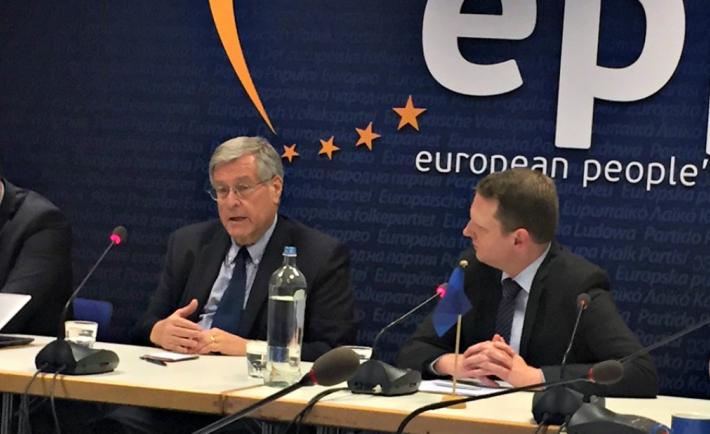
NDI President Ken Wollack addressing leaders of the EPP, ALDE and PES parties at EPP headquarters in Brussels, October 2017
NDI President Ken Wollack visited Brussels this fall to discuss how democracy is faring in Central and Eastern Europe as the region confronts heightened Kremlin involvement, democratic backsliding and rising skepticism over European integration. Among other interlocutors, Wollack met with leaders of the European People’s Party (EPP), the Alliance of Liberals and Democrats in Europe (ALDE), and the Party of European Socialists (PES), plus affiliated think tanks. NDI has affiliation with all three party groups and works with them to support political party development and reform.
The European leaders spoke of combining forces in the former Yugoslavia, Central Europe and Eastern Partnership countries to resolve ongoing partisan conflicts that harm good governance and political consensus. It’s the kind of demonstrable engagement that Europe can make at a time when many countries, both in and outside of the European Union (EU), need democracy booster shots. NDI’s in-country programs and longstanding relations with European political parties across the mainstream spectrum make the Institute a bridge between Brussels and Europe’s eastern reaches.
Wollack’s visit coincided with five NDI missions to Brussels over the fall that tie political and institutional reform with European values and integration such as:
- renewing and advancing the political skills of young people in mainstream political parties;
- sharing recent NDI research on disinformation in Serbia;
- supporting institutional relationships between legislatures in the Balkans and the European Parliament and
- enabling ethnic and racial minority leaders in Central Europe to discuss their communities’ needs and priorities with EU lawmakers
NDI led two groups of young politicians from the Balkans—both from Center-right parties and from Liberals—to Brussels to engage members of the European parliament, representatives of the EPP and ALDE, and affiliated think-tanks such as the Wilfried Martens Center and European Liberal Forum. The visits gave aspiring leaders the chance to meet Brussels counterparts and share their views on shaky political environments at home. They discussed how EU integration remains critical to sustaining peace and democracy, and got a better understanding of the complexities of European politics. NDI led a similar group of young Social Democrats to Brussels earlier this year.
NDI’s Serbia director, together with the head of Belgrade-based Center for Research, Transparency, and Accountability (CRTA), were in Brussels in September to showcase CRTA’s recent public opinion and media research, which demonstrates strong public affinity for Kremlin narratives. According to the polling, public support for Serbia’s EU membership is falling. Furthermore, economic union with Russia is equally desirable to joining the EU, and a majority would withdraw from EU membership if it jeopardized relations with Moscow. A majority believe disinformation assertions that Russia’s military strength is on par with NATO, that Moscow invests as much in Serbia as do EU countries, and that Brussels and Washington are conspiring to create so-called Greater Albania. CRTA’s analysis draws correlation between media bias and public attitudes. NDI and CRTA presented the data to key EU political figures who now have a clearer picture of the inroads that Moscow propaganda is making in Serbia and the Balkans as a whole.
Bolstering the democratic performance of governing institutions can combat the Kremlin’s false narratives. Parliaments play an essential role in this regard when it comes to political representation, lawmaking and executive oversight. To that end, NDI has helped legislatures in the Balkans improve their research capacity to review draft laws and query government officials—and leverage European integration in the process. NDI brought two legislative directors—from the Macedonian and Montenegrin parliaments, respectively—to a recent seminar of the European Parliamentary Center for Research and Development (EPCRD), where they discussed utilizing EU legislative research to inform their work, as well as contributing to the EU’s research.
For leaders of minority communities in Central Europe—Roma, Jewish, Muslim, African, Ukrainian among them—the political climate is growing colder as populist and nationalist discourse intensifies. They have banded together with Christian and other majority organizations to promote pluralism and equality by taking their message of inclusion and tolerance directly to the public— through art, education and sport. As citizens and residents of EU member-states, these communities look to Brussels for protection against homegrown threats to their equal rights as enshrined in national constitutions and EU law. NDI organized a November visit to Brussels for 20 community leaders to share their insights with European politicians and officials. They spelled out opportunities for Brussels to ensure, through its development funds and policymaking, equal treatment for all.
Europe, as elsewhere, is experiencing widespread and even profound political uncertainty. At the same time, democratic values of equality, pluralism and constructive political discourse cannot be discarded. Through its in-country presence in Europe’s emerging democracies, such as Albania, Macedonia and Serbia, and in its relationships across Brussels’ political and governance institutions, NDI is supporting hundreds of people who devote themselves to these values, in high politics, at the grassroots and everywhere in between.
